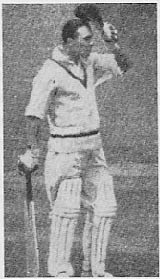'It all came down to the follow-on'
|
|

|
My most memorable match has to be the second Test against Australia, at Lord's, in 1934. In this game I was fortunate enough to score a century, but this is not the reason I have chosen it. The match will always be remembered, and rightly so, as 'Verity's match'. Hedley Verity, the Yorkshire slow-medium left-arm bowler, took 15 wickets in Australia's two innings, 14 of them in one day!
The result was an England victory by an innings and 38 runs, but this statement reveals none of the drama and excitement.
England batted first and made 440 on a beautiful pitch. Apart from my century (I was badly missed by that prince of wicketkeepers, Bert Oldfield, when 96), Maurice Leyland made a superb hundred, hitting a six and 14 fours. This Yorkshire left-hander always seemed to get the better of Australia's two great leg-spinners, Grimmett and O'Reilly, and his record against Australia was quite phenomenal.
Strange to say, England's greatest three batsmen at that time - Sutcliffe, Hammond and Hendren - all failed.
At the close of play on the second day (Saturday) Australia had made 192 for 2, with Bill Brown 103 not out, but during Sunday night Lord's had a severe thunderstorm, and England's poser was: can we get the remaining eight Aussie wickets for something under 90 so that we could enforce the follow-on? Failure would mean that England would have to bat on a sticky wicket. The result of the match depended on it.
Australia failed by only six runs to save the follow-on, but there were many anxious moments before the last wicket fell. Brown was out soon after play started on the Monday, and with Len Darling failing to score and Stan McCabe out one run later, it meant that there were now only five wickets to get, with still over 80 needed to save the follow-on.
Everyone now was fairly confident, with Verity bowling so well. I personally thought the wicket was getting more dif ficult, and that Australia had little chance of getting the runs.
However, Arthur Chipperfield and Oldfield had different ideas, and, taking no chances, the two put on 40 priceless runs before Oldfield was well caught by Sutcliffe off Verity. A further 16 runs came before Clarrie Grimmett was bowled by Bill Bowes.
Sixteen runs were now needed, with Chipperfield still there. O'Reilly hit one huge four off Verity, but, trying again, was clean bowled. Tim Wall, last man in, with six runs needed to make England bat again, was then out for a duck, and Australia, to our relief, had to follow on.
The pitch was never really spiteful, but it certainly gave Verity some assistance. No doubt the Australians badly missed Bill Ponsford, who was unfit, for, with the exception of Woodfull, Bradman and McCabe, the others had had little or no experience of batting on such a pitch or against a bowler of Verity's class. (Brown, who made 105, scored 103 of these on the Saturday).
In the follow-on nobody, with the exception of Woodfull, who made a very dogged 43 before being caught by Hammond at first slip, showed much resistance - not even Don Bradman, who, we all feared, might have made one of his mammoth scores. He never looked like getting on top of Verity. He reached 13 and then, attempting a huge hit at Verity, he hit what we cricketers call a 'steeples' - up and up it went, high over the silly mid-off to gully area. I don't think anyone really fancied it, knowing that a missed catch from Bradman could cost the side a very great number of runs and maybe the match. A firm call from Wally Hammond, the captain, rang out: "Yours, Les!" Although I had no more than six or eight paces to go, my heart was in my mouth.
Remember, normally a wicketkeeper never has the time to worry about a snicked catch. But here was the greatest batsman the game has known giving me quite a different type of catch. Fortunately the ball, which at one time seemed about the size of a golf-ball in the sky, landed safely in my gloves.
Wickets continued to fall at regular intervals, and England ultimately won, beating Australia at Lord's for the first time since 1896. I can still see that stratospheric hit of Bradman's when I close my eyes.
